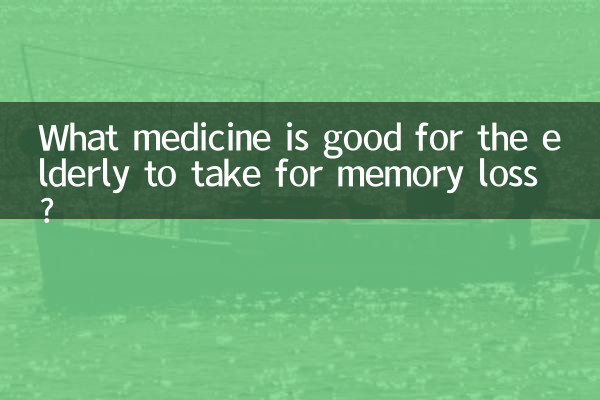What medicine is good for the elderly to take for memory loss?
As the aging of the population intensifies, the problem of memory loss in the elderly has attracted much attention. In recent years, medical research and the nutraceutical market have introduced various solutions to this phenomenon. This article will combine the hot topics and hot content on the Internet in the past 10 days to provide scientific medication suggestions for the elderly with memory loss, and attach structured data for reference.
1. Common causes of memory loss in the elderly

Memory loss in the elderly may be related to the following factors:
| Reason type | Specific performance |
|---|---|
| physiological degeneration | Brain cells naturally age and nerve conduction speed slows down |
| pathological factors | Alzheimer's disease, cerebrovascular disease, etc. |
| psychological factors | Depression, anxiety and other emotional problems |
| lifestyle | Lack of sleep, lack of exercise, poor eating habits |
2. Recommendations for drugs to improve memory
According to recent medical research and clinical practice, the following drugs have certain effects on improving memory in the elderly:
| drug type | Representative medicine | Mechanism of action | Things to note |
|---|---|---|---|
| cholinesterase inhibitor | donepezil, galantamine | Increase acetylcholine levels in the brain | Requires doctor's prescription, may have gastrointestinal side effects |
| NMDA receptor antagonist | Memantine | Regulates glutamate neurotransmitter | Suitable for patients with moderate to severe dementia |
| Brain metabolism improving drug | Piracetam, Oxiracetam | Promote brain cell energy metabolism | Requires long-term use to be effective |
| Chinese medicine preparations | Ginkgo leaf extract, ginsenosides | Improve cerebral circulation, antioxidant | Be aware of interactions with other medications |
3. Nutrients that help improve memory
In addition to drug treatment, proper supplementation of the following nutrients can also help improve memory:
| Nutrients | main food source | Recommended daily intake |
|---|---|---|
| Omega-3 fatty acids | Deep sea fish, flaxseed | 250-500mg DHA/day |
| B vitamins | Whole grains, green leafy vegetables | B complex vitamin supplement |
| Antioxidants | Blueberries, dark chocolate | Eat in moderation |
| Lecithin | eggs, soybeans | 500-1000mg/day |
4. Medication precautions
1. All drugs should be used under the guidance of a doctor and cannot be purchased and taken by oneself.
2. The effects of drugs vary from person to person, and regular follow-up visits are required to evaluate the efficacy.
3. Pay attention to drug interactions, especially for the elderly who take multiple drugs at the same time
4. Drugs are only auxiliary means, and the effect is better when combined with cognitive training.
5. Non-drug improvement suggestions
1.Regular exercise:Moderate intensity aerobic exercise 3-5 times per week
2.Social events:Staying socially connected stimulates brain activity
3.Cognitive training:Reading, playing chess, learning new skills, etc.
4.Get enough sleep:Guarantee 7-8 hours of quality sleep
5.Reduce stress and relax:Stress reduction methods such as meditation and deep breathing
Conclusion:
Memory loss in the elderly is a complex physiological process, of which drug treatment is only part. Memory decline can be effectively delayed through rational use of medication, a healthy lifestyle and appropriate cognitive training. It is recommended that elderly friends and family members receive regular professional medical consultation and formulate personalized prevention and treatment plans.

check the details

check the details